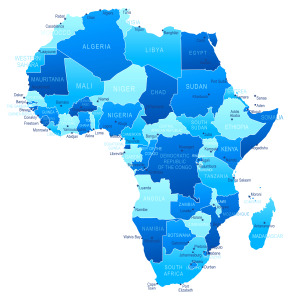Trade Facilitation: A Critical Element for Africa’s Place in the Global Value Chain
 The case for regional integration in Africa has been made, by Donald Kaberuka, President of the African Development Bank, as well as by other well-known African authorities. So the question that now arises is how can regional integration be accomplished? Large amounts of money – both public and private – are being expended for transportation infrastructure. Yet, there is an institutional deficiency that substantially impedes regional integration. It is the customs red tape and paper work at the border. These non-tariff barriers that cause customs delays and uncertainty obstruct regional integration just as much as inadequate infrastructure, thereby preventing Africa from finding its place in the 21st Century global value chain.
The case for regional integration in Africa has been made, by Donald Kaberuka, President of the African Development Bank, as well as by other well-known African authorities. So the question that now arises is how can regional integration be accomplished? Large amounts of money – both public and private – are being expended for transportation infrastructure. Yet, there is an institutional deficiency that substantially impedes regional integration. It is the customs red tape and paper work at the border. These non-tariff barriers that cause customs delays and uncertainty obstruct regional integration just as much as inadequate infrastructure, thereby preventing Africa from finding its place in the 21st Century global value chain.
There is a convergence of events that creates a unique opportunity to address this inadequacy. In December 2013, the WTO struck a deal on Trade Facilitation. The WTO Trade Facilitation Agreement establishes binding commitments for WTO members to expedite the movement, release and clearance of goods as well as help developing countries fully implement their obligations. It is hoped that improved customs procedures and trade facilitation will help small and medium-sized businesses gain access to new export opportunities by easing burdensome and sometimes obstructive customs procedures. Some say that the agreement could boost the world economy by as much as $1 trillion, with much of the benefits to accrue to developing countries like those in Africa. This comes at the same time as renewal of the African Growth and Opportunity Act (AGOA) is being discussed. On January 14, 2014, the U.S. International Trade Commission (USITC) held hearings on various AGOA-related topics, including: (1) AGOA trade and investment performance; (2) the economic effects of providing duty-free treatment to AGOA-eligible countries; (3) possible changes to AGOA’s rules of origin to promote regional integration and to increase exports to the U.S.; and (4) the impact of EU’s free trade agreement with South Africa on U.S. exports. A common theme raised at the hearing and in the submissions to the USITC was the importance of improved customs procedures and trade facilitation for Africa to participate in global trade or value chains.
As noted by Scott Eisner from the U.S. Chamber of Commerce, “African governments can promote jobs, growth, and economic opportunities for businesses of all sizes by eliminating barriers at the border and facilitating legitimate trade.” He further noted a World Economic Forum & World Bank report showing that “trade facilitation is six times more effective in promoting global economic growth than eliminating tariffs alone.”
The real challenge for Africa will be implementation of the Agreement. African countries will need to implement their commitments and avail themselves of technical assistance and capacity building set forth in Section II of the Agreement. A commitment to customs reform and modernization by the Sub-Saharan countries could provide further support for AGOA renewal. In fact, AGOA renewal legislation could include provisions to enhance trade facilitation by structured dialogue and capacity building. The U.S.-Africa Leaders Summit announced January 21, 2014 by the White House, to take place August 5-6, 2014 in Washington, D.C., would provide yet another opportunity to advance the goal of trade facilitation in Africa.
In sum, trade facilitation is critical for Sub-Saharan Africa’s goals of regional integration as well as finding its place in the global value chain.
